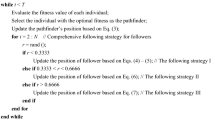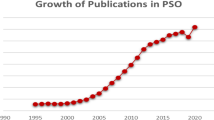Abstract
This paper proposes an enhanced particle swarm optimization with dynamic mutation and special initialization, the EPSODM-I, for improving the accuracy of zero-order TSK-type fuzzy systems design. The EPSODM-I can be regarded as a new population-based evolutionary optimization algorithm. Unlike the generic initialization used in most popular population-based algorithms, the EPSODM-I applies a proposed special initialization method to generate the initial PSO particles for fuzzy system design. The generated initial PSO particles are iteratively improved by a new approach incorporating the dynamic mutation into the existing PSO to provide more diverse search directions. Application examples of the zero-order fuzzy system designs for the tracking control of nonlinear dynamic systems have been simulated to validate the proposed algorithm. In terms of tracking errors, performance comparisons with the typical PSO and different advanced PSO variants verify the superiority of the proposed algorithm. The effects on the convergence rate and optimization accuracy yielded by the proposed special initialization and dynamic mutation have also been discussed and verified crossly in the simulation results.











Similar content being viewed by others
References
Goldberg, D.E.: Genetic Algorithms in Search Optimization and Machine Learning. Addison-Wesley, Reading, MA (1989)
Kennedy, J., Eberhart, R., Shi, Y.: Swarm Intelligence. Morgan Kaufmann, San Mateo, CA (2001)
Homaifar, A., McCormick, E.: Simultaneous design of membership functions and rule sets for fuzzy controllers using genetic algorithms. IEEE Trans. Fuzzy Syst. 3(2), 129–139 (1995)
Shi, Y., Eberhart, R., Chen, Y.: Implementation of evolutionary fuzzy systems. IEEE Trans. Fuzzy Syst. 7(2), 109–119 (1999)
Belarbi, K., Titel, F.: Genetic algorithm for the design of a class of fuzzy controllers: an alternative approach. IEEE Trans. Fuzzy Syst. 8(4), 398–405 (2000)
Juang, C.F.: A TSK-type recurrent fuzzy network for dynamic systems processing by neural network and genetic algorithms. IEEE Trans. Fuzzy Syst. 10(2), 155–170 (2002)
Cordón, O., Gomide, F., Herrera, F., Hoffmann, F., Magdalena, L.: Ten years of genetic fuzzy systems: current framework and new trends. Fuzzy Sets Syst. 141(1), 5–31 (2004)
Lin, C.J.: A GA-based neural fuzzy system for temperature control. Fuzzy Sets Syst. 143(2), 311–333 (2004)
Chou, C.H.: Genetic algorithm-based optimal fuzzy controller design in the linguistic space. IEEE Trans. Fuzzy Syst. 14(3), 372–385 (2006)
Mucients, M., Moreno, D.L., Bugarin, A., Barro, S.: Design of a fuzzy controller in mobile robotics using genetic algorithms. Appl. Soft Comput. 7(2), 540–546 (2007)
Dorigo, M., Maniezzo, V., Colorni, A.: Ant system: optimization by a colony of cooperating agents. IEEE Trans. Syst. Man Cybern. B 26(1), 29–41 (1996)
Dorigo, M., Gambardella, L.M.: Ant colony system: a cooperating learning approach to the traveling salesman problem. IEEE Trans. Evol. Comput. 1(1), 53–66 (1997)
Socha, K., Dorigo, M.: Ant colony optimization for continuous domains. Eur. J. Oper. Res. 185(3), 1155–1173 (2008)
Juang, C.F., Chang, P.H.: Designing fuzzy-rule based systems using continuous ant-colony optimization. IEEE Trans. Fuzzy Syst. 18(1), 138–149 (2010)
Chen, C.C., Shen, L.P., Huang, C.F., Chang, B.R.: Assimilation-accommodation mixed continuous ant colony optimization for fuzzy system design. Eng. Comput. 33(7), 1882–1898 (2016)
Eberchart, R., Kennedy, J.: A new optimizer using particle swarm theory. In: Proceedings of the International Symposium on Micro Machine and Human Science, Nagoya, Japan, pp. 39–43 (1995)
Shi, Y., Eberchart, R.: A modified particle swarm optimizer. In: Proceedings of the IEEE World Conference on Computational Intelligence, pp. 69–73 (1998)
Ratnaweera, A., Halgamuge, S., Watson, H.: Self-organizing hierarchical particle swarm optimizer with time-varying acceleration coefficients. IEEE Trans. Evol. Comput. 8, 240–255 (2004)
Chen, X., Li, Y.: A modified PSO structure resulting in high exploration ability with convergence guaranteed. IEEE Trans. Syst. Man Cybern. B 37(5), 1271–1289 (2007)
Gao, H., Xu, W.B.: A new particle swarm algorithm and its globally convergent modifications. IEEE Trans. Syst. Man Cybern. B 41(5), 1334–1351 (2011)
Li, N.J., Wang, W.J., Hsu, C.C.J., Chang, W., Chou, H.G.: Enhanced particle swarm optimizer incorporating a weighted particle. Neurcomputing 24, 218–237 (2014)
Olivas, F., Valdez, F., Castillo, O., Melin, P.: Dynamic parameter adaptation in particle swarm optimization using interval type-2 fuzzy logic. Soft. Comput. 20(3), 1057–1070 (2016)
Wang, H., Wang, W., Wu, Z.: Particle swarm optimization with adaptive mutation for multimodal optimization. Appl. Math. Comput. 221, 296–305 (2013)
Liang, H.T., Kang, F.H.: Adaptive mutation particle swarm algorithm with dynamic nonlinear changed inertia weight. Optik 127, 8036–8042 (2016)
Tanweer, M.R., Suresh, S., Sundararajan, N.: Self regulating particle swarm optimization algorithm. Inf. Sci. 294, 182–202 (2015)
Meng, A., Li, Z., Yin, H., Chen, S., Guo, Z.: Accelerating particle swarm optimization using crisscross search. Inf. Sci. 329, 52–72 (2016)
Clerc, M., Kennedy, J.: The particle swarm explosion, stability, and convergence in a multidimensional complex space. IEEE Trans. Evol. Comput. 6, 58–73 (2002)
Ruben, E.P., Kamran, B.: Particle swarm optimization in structural design. In: Chan, F.T.S., Tiwari, M.K. (eds.) Swarm Intelligence: Focus on Ant and Particle Swarm Optimization, pp. 373–394. I-Tech Education and Publishing, Vienna (2007)
Juang, C.F.: A hybrid of genetic algorithm and particle swarm optimization for recurrent network design. IEEE Trans. Syst. Man Cybern. B 34(2), 997–1006 (2004)
Juang, C.F., Chung, I.F., Hsu, C.H.: Automatic construction of feedforward/recurrent fuzzy systems by clustering-aided simplex particle swarm optimization. Fuzzy Sets Syst. 158(18), 1979–1996 (2007)
Juang, C.F., Lo, C.: Zero-order TSK-type fuzzy system learning using a two-phase swarm intelligence. Fuzzy Sets Syst. 159(21), 2910–2926 (2008)
Juang, C.F., Wang, C.Y.: A self-generating fuzzy system with ant and particle swarm cooperative optimization. Exp. Syst. Appl. 36(3), 5362–5370 (2009)
Glerc, M.: Initialisations for particle swarm optimization. http://clerc.maurice.free.fr/pso (2008). Accessed 24 July 2017
Parsopoulos, K.E., Vrahatis, M.N.: Modification of the particle swarm optimizer for locating all the global minima. In: Kurkova, V., Steele, N.C., Neruda, R., Karny, M. (eds.) Artificial Neural Nets and Genetic Algorithms, pp. 324–327. IASTED/ACTA Press, Springer (2001)
Parsopoulos, K.E., Vrahatis, M.N.: Initializing the particle swarm optimizer using the nonlinear simplex methods. In: Grmela, A., Mastorakis, N.E. (eds.) Advances in Intelligent Systems, Fuzzy Systems, Evolutionary Computation, pp. 216–221. WSEAS Press, Interlaken, Switzerland (2002)
Richards, M., Ventura, D.: Choosing a starting configuration for particle swarm optimization. In: Proceedings of the International Joint Conference on Neural Networks, pp. 2309–2312 (2004)
Rahnamayan, S., Wang, G.G.: Center-based sampling for population-based algorithms. In: IEEE Proceedings of the Eleventh Conference on Congress on Evolutionary Computation, Trondheim, Norway, May 18–21, 2009, pp. 933–938
Cordón, O., Herrera, F.: A three-stage evolutionary process for learning descriptive and approximate fuzzy-logic-controller knowledge bases from examples. Int. J. Approx. Reason. 17, 369–407 (1997)
Cordón, O., Herrera, F.: A two-stage evolutionary process for designing TSK fuzzy rule-based systems. IEEE Trans. Syst. Man Cybern. B 29(6), 703–715 (1999)
Yahya, A.A., Osman, A., El-Bashir, M.S.: Rocchio algorithm-based particle initialization mechanism for effective PSO classification of high dimensional data. Swarm Evol. Comput. 34, 18–32 (2017)
Derrac, J., García, S., Molina, D., Herrera, F.: A practical tutorial on the use of nonparametric statistical tests as a methodology for comparing evolutionary and swarm intelligence algorithms. Swarm Evol. Comput. 1(1), 3–18 (2011)
Acknowledgements
This work was supported by Ministry of Science and Technology, Taiwan under Grants MOST 104-2221-E-415-006 and MOST 105-2221-E-415-018.
Author information
Authors and Affiliations
Corresponding author
Rights and permissions
About this article
Cite this article
Chen, CC. Optimization of Zero-Order TSK-Type Fuzzy System Using Enhanced Particle Swarm Optimizer with Dynamic Mutation and Special Initialization. Int. J. Fuzzy Syst. 20, 1685–1698 (2018). https://doi.org/10.1007/s40815-018-0453-z
Received:
Revised:
Accepted:
Published:
Issue Date:
DOI: https://doi.org/10.1007/s40815-018-0453-z




